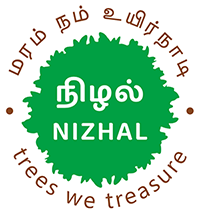Chennai-based NGO Nizhal was founded in September 2005, when a small group of tree lovers came together to make a difference in Chennai by working with communities toward sensitive greening practices.
Branching into care
With Nizhal, Shobha, and her team set out to heal both lands and minds. In busy cities and fast-paced lives, minds need peace. She believes that once people participate and volunteer their time for nature, they will see nature for what it truly is: healing. That is the constant goal the team hopes to achieve.
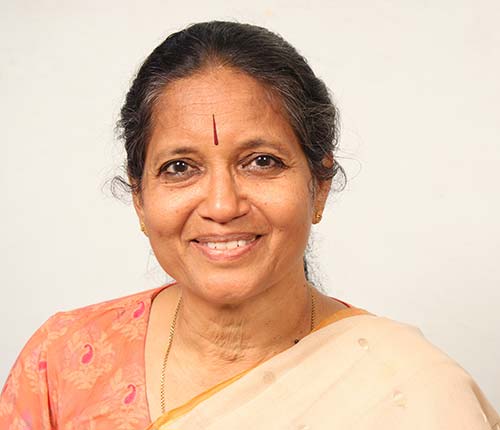
“For over a decade, I had been writing on civic, social, and environmental issues for newspapers and other media outlets. I felt that greening was not looked at as a pressing civic issue, but greenery is vital to any region, cities especially, to combat pollution and provide shade. People ask for roads, lights, and water, but no one asks for trees, even today. We started Nizhal out of sheer passion, and Mr Dattatri, the first Chief Town Planner of Chennai, Mr Theodore Baskaran, writer and retired Chief Postmaster General of Tamil Nadu, Dr P. Dayanandan, reputed botanist and Professor, and Dr Sekhar Raghavan, the ‘Rain Man’ of India, are a few of our distinguished advisors who have helped build the organisation. All of us felt deeply about the cause, and we had a lot of ideas for the safety of trees and cities,” she mentions.
Laying the groundwork
At that time, greening programs were mostly ad hoc, and there was minimal sensitivity to the idea of greening. It was often publicised that there were 10,000 saplings planted, but what saplings? Where? Can they even grow and survive in the areas where they’re planted? Up until 2004, Shobha shares, she, along with friends, would plant indigenous trees in government school campuses. Dr Raghavan convinced her to start an NGO for trees; she was already doing so much for their awareness and care, after all. A small group of tree lovers got together, and Nizhal was registered as a Trust.
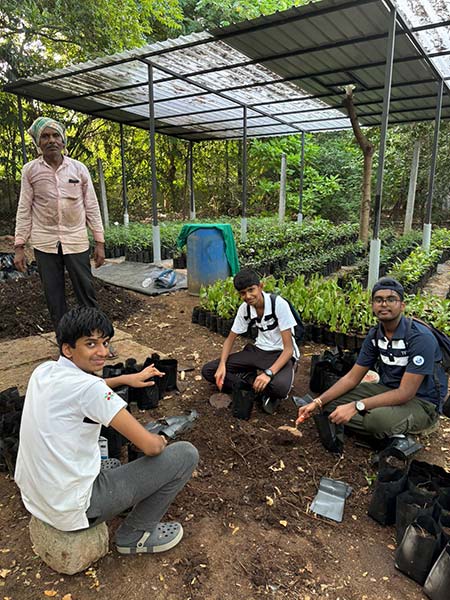
The name ‘Nizhal’ translates to ‘shade’ in Tamil, Shobha notes. The founders wanted to choose a name in the local language that reflected how imperative trees are to society. From day one, their goal was clear: create a campaign for people to connect, care, and stand up for trees around them!
Growing a movement
“We want this to be a people’s movement; we want more people to get involved and join this cause, for their own selves. Initially, we were trying to raise awareness on areas of concern. Planting the right trees in the right locations with sensitivity. For instance, planting huge trees on narrow roads can impact their long-term growth, hinder traffic and adversely affect residents. Smaller trees or shrubs need to be in place. Contrary to people’s immediate reactions, it is never the tree’s fault, but that of insensitive planting.
To help citizens get a better understanding, one of our core members suggested tree walks. It is, as the name suggests, walking around neighbourhoods or green campuses and learning about the trees that grow there. The hope is that people participate in these walks, see the importance of nature, and start to care and speak up for the trees around them,” she smiles.
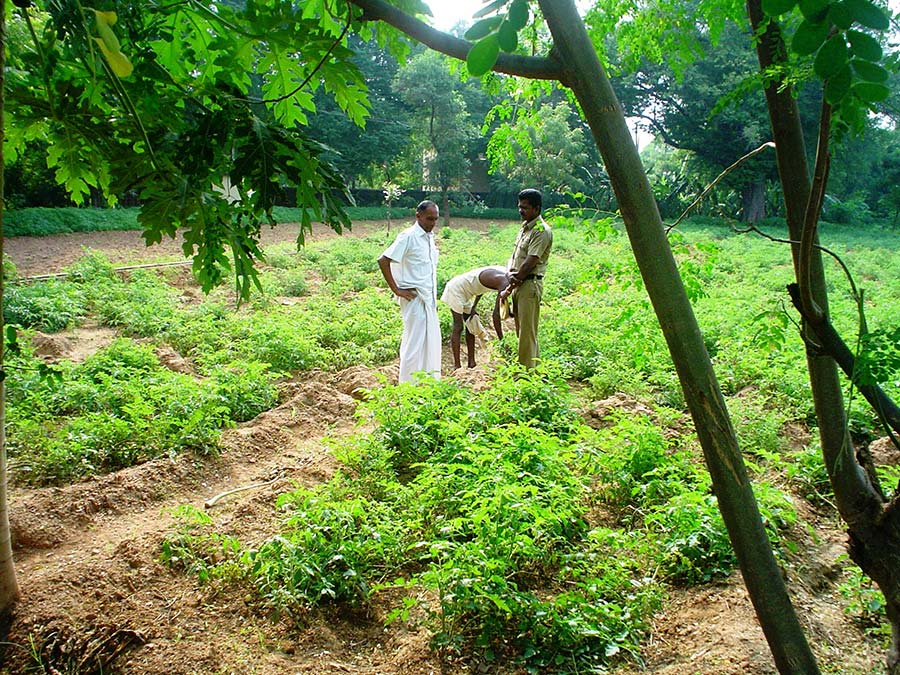
The beautiful thing about Nizhal is, it developed organically, whether in the number of volunteers or the activities they do. The tree walks turned into an exercise in love and care. They identify trees that are abused, remove advertisement boards nailed to their trunks, and put some fresh soil and turmeric on their wounds. They physically communicate how much they care.
In 2006, the Public Works Department reached out to Nizhal, asking them to transform a space in Kotturpuram from five acres of empty land lying unused into a park. They were faced with dirt, mounds of trash, and countless bags of liquor bottles. They dealt with it all, bit by bit, volunteer by volunteer, plant by plant. Now, the space stands tall as Kotturpuram Urban Forest. From a place that didn’t even have an earthworm, it is now home to around 1000 trees and shrubs, mongooses, and many birds. Recently, even a paradise flycatcher! For the last 20 years, volunteers have come together every weekend and continue to care for the space. This is just the beginning of what can be achieved if people come together for a cause.
A forest built through community
“Getting people to take the time out to volunteer on the weekends was challenging in the early years, but it’s getting better now. We call it community volunteering. In the beginning, we had to reach out to people out of necessity, since we only had a few people taking care of the entire five acres with a single hand pump. Now, it is a completely community-nurtured space. It is no longer a prerequisite, but a platform for people to be part of and give back to a green space. Software engineer, carpenter, homemaker, or student, anyone and everyone can contribute to this space. Contribution is not solely monetary; your time and effort matter just as much, if not more, in our case. Owing to the committed volunteers, we are currently working on nine similar projects across the city that transform and nurture green spaces,” she says.
Along with the work they do in neighbourhoods, the Nizhal team has worked with all the prisons across Tamil Nadu. They have introduced organic farming modules for prisoners so that all prisons are self-sustaining in their vegetable requirements. The prisoners and staff at the prisons enjoy the benefit of healthy pesticide-free vegetables and also participate in activities that are therapeutic and healing.
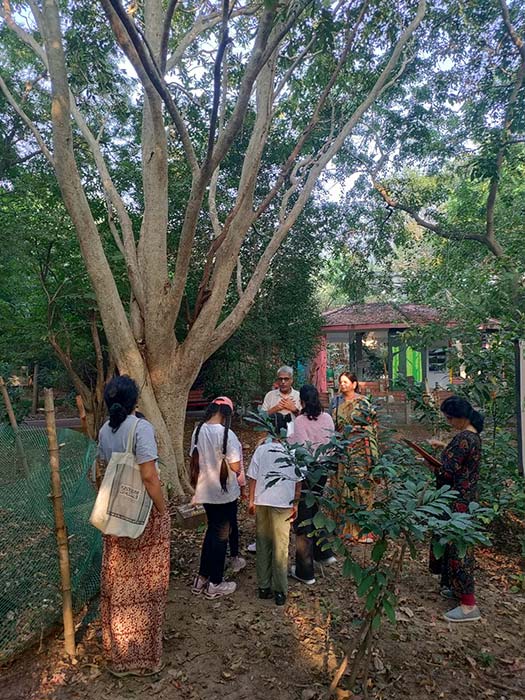
Additionally, Nizhal’s therapeutic garden program was initiated in the Institute of Mental Health, Kilpauk, over 15 years ago. The program has been a resounding success, and patients and staff benefit from the organic vegetables raised on the campus.
Three years ago, Nizhal was chosen to become part of the State and District Green Committees in Tamil Nadu. To be part of policy decisions for the protection of mature trees across the State has been a great privilege, Shobha expresses.
Cultivating clarity through the haze
“I think our tree walks can pave the way to real action. Knowing and understanding the trees around you is a way forward to support them. Generally, when a resident moves to a new neighbourhood, the first thing they look for is probably the nearest provision store. But a healthy green cover in your neighbourhood is also important; how many of us really look into this aspect? Once we develop sensitivity towards trees in our residential areas, we can ask questions like ‘Are they healthy?’ ‘Are they in need of care?’ ‘Is there something we can do about it?’ Noticing signs of abuse on tree walks can be a stepping stone to doing more and making a change. When residents of a neighbourhood care for trees and green spaces around them, it can pave the way to a healthier locality. That way, you support the trees, and you, in turn, are supported by them. Once we understand the intrinsic value of green spaces and trees for our own present and future, it becomes easier to invest more time and thought into caring,” Shobha says.
On the topic of public involvement, she clarifies, “Climate change is very real. How many of us are aware that we are responsible for prolonging it or curbing its effects? How many more calamities need to happen for us to understand that? It’s not enough to be ‘nature-lovers’, take photographs, and post them online. Caring for nature means acting proactively to reduce the current spiralling rates of environmental damage, in whatever ways we can. Awareness needs to go hand in hand with action simultaneously,” Shobha voices passionately.
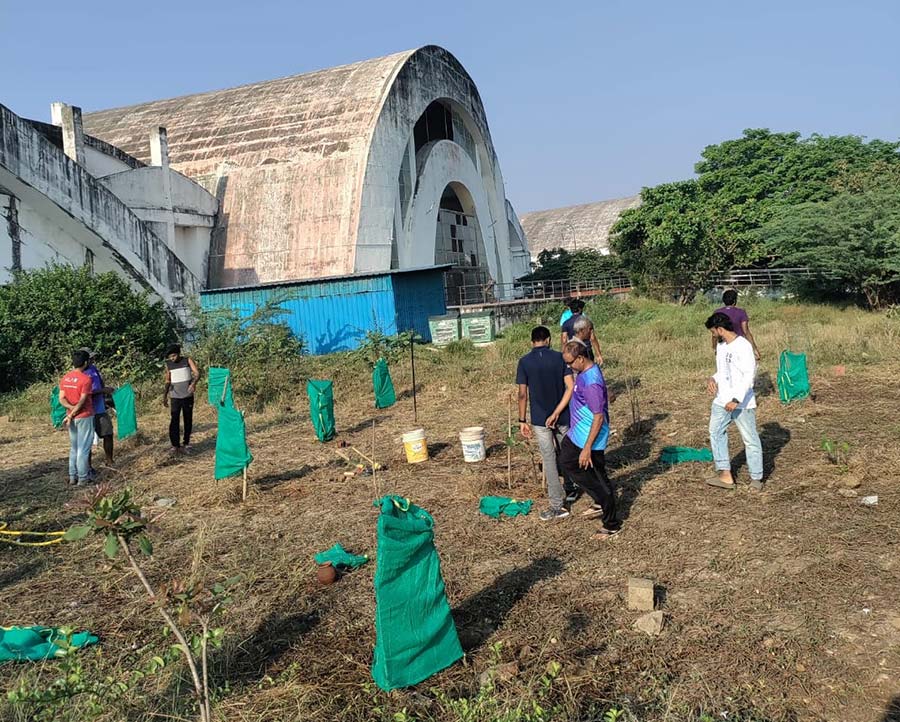 Volunteers at the Velachery MRTS site
Volunteers at the Velachery MRTS site
Many a time, however, it is about the ‘convenient’ choices; to choose not to see what is right. The biggest lessons she’s learned over the years, observing so many different people? Keep expectations at a minimum and try to do everything possible for the cause!
Every leaf counts
Nizhal is completely volunteer-driven, and for the team, their work is of utmost priority. “Our team includes marine engineers, bankers, entrepreneurs, carpenters, teachers, mechanics, doctors and artists; all from different cross sections of society. It is truly heartwarming that all of them give what they can, without expecting anything in return. For me, personally, Nizhal has become my life’s breath. Each day is a chance to do something for the Nizhal cause,” she concludes.
For further details, check the Nizhaltn website www.nizhaltn.org

